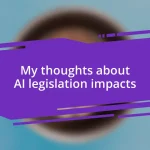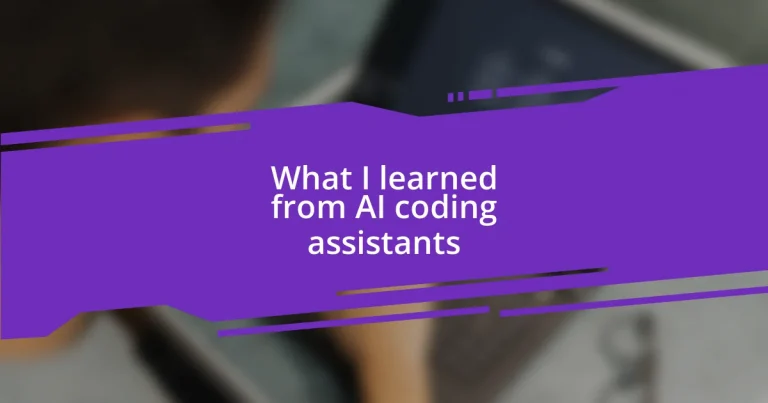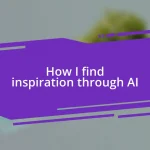Key takeaways:
- AI coding assistants enhance productivity by streamlining tasks like code completion, error detection, and automated testing, reducing development time and improving code quality.
- While AI tools offer considerable support, users must balance reliance on AI with critical thinking, ensuring they actively engage with the coding process to maintain their skills.
- The future of AI in coding holds the potential for anticipating challenges and enhancing creativity, but it also raises ethical concerns about over-reliance on AI in decision-making.
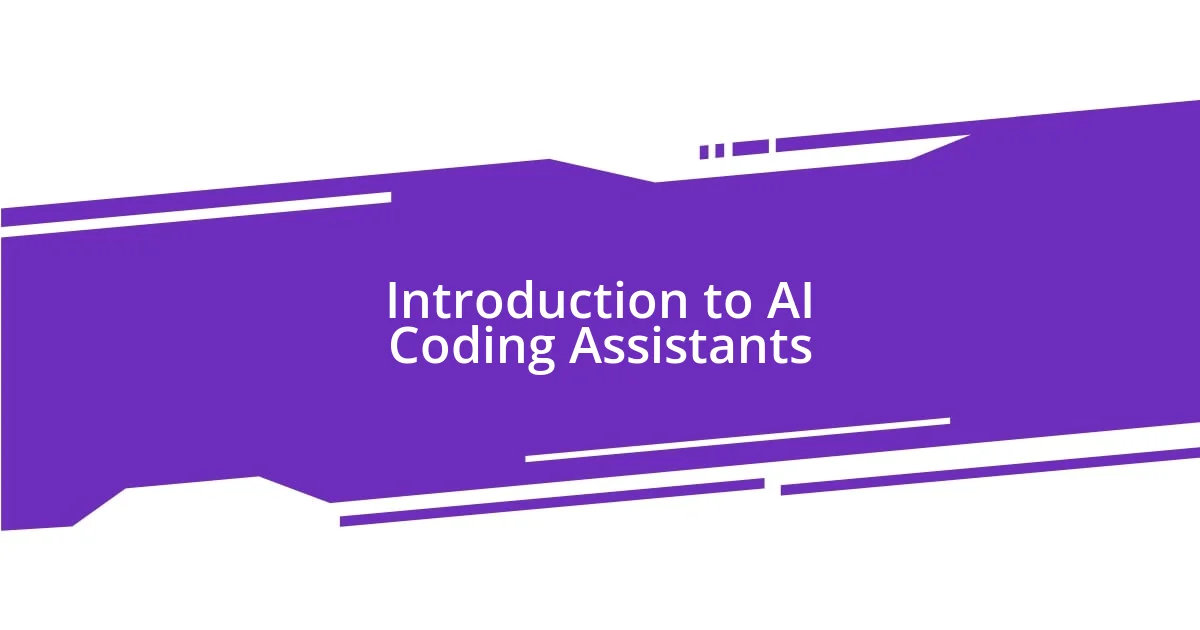
Introduction to AI Coding Assistants
AI coding assistants have rapidly transformed the way we approach software development. I remember the first time I used one; I was skeptical but curious about how it could simplify my coding tasks. Could a machine really understand my intentions and improve my workflow?
These tools leverage powerful algorithms to suggest code snippets, debug errors, and even provide explanations for complex concepts. It’s remarkable how, on days when I felt stuck, simply typing a couple of keywords generated solutions I hadn’t considered. Have you ever felt that same sense of frustration?
In my experience, working alongside an AI coding assistant feels like having a knowledgeable partner in the room. It not only streamlines the coding process but also helps me learn along the way. With every suggestion and correction, I found myself picking up new skills, which is a thrilling aspect of collaborating with artificial intelligence.
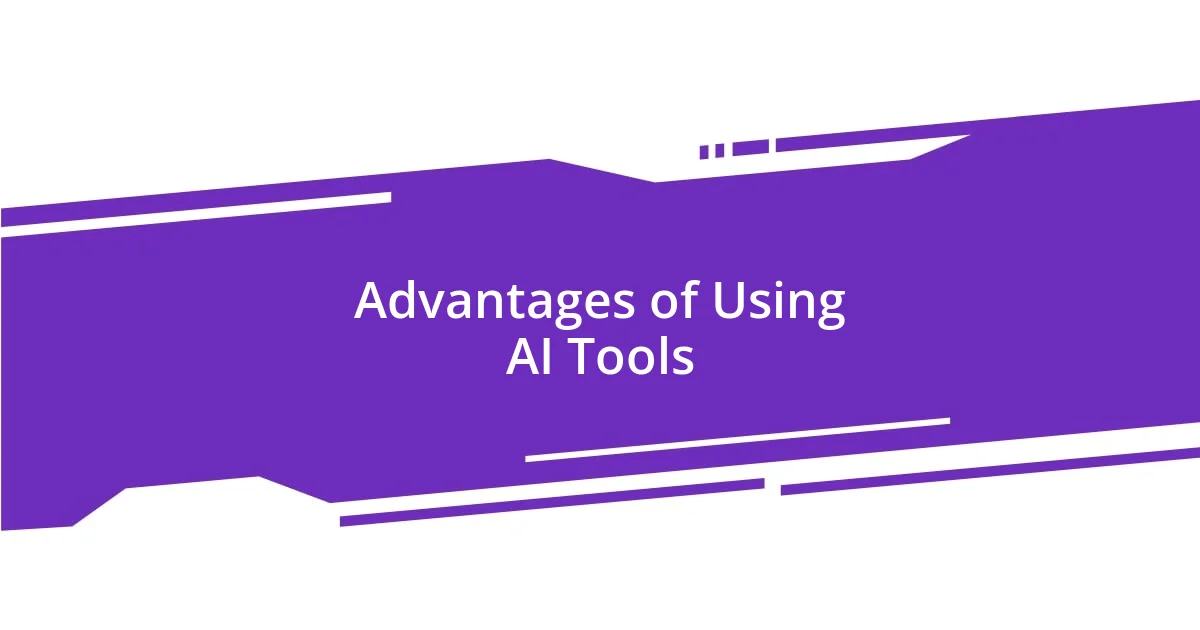
Advantages of Using AI Tools
Utilizing AI coding tools has profoundly enhanced my productivity and efficiency as a developer. I recall a particularly hectic project deadline where I was juggling multiple tasks. With an AI assistant by my side, I could quickly generate functions and troubleshoot issues, freeing up my mental bandwidth for more creative problem-solving. It felt like having a supercharged assistant who never tires and always delivers.
Here are some specific advantages of using AI tools in coding:
- Speed: AI assists in generating code snippets and automating repetitive tasks, significantly reducing development time.
- Error Reduction: By identifying bugs or suggesting optimizations, these tools help improve overall code quality.
- Learning Opportunities: I’ve found myself grasping new languages and frameworks more readily, as AI offers tailored explanations that resonate with my learning style.
- Collaboration: AI supports teamwork by ensuring everyone is on the same page, suggesting best practices and sharing knowledge seamlessly.
- Accessibility: These tools can lower the barrier to entry for newcomers in programming, providing guidance and support as they learn.
With all these advantages, using AI coding assistants truly feels like an investment in my skillset and the quality of my work. Each interaction leaves me feeling empowered and more equipped to tackle challenges head-on.
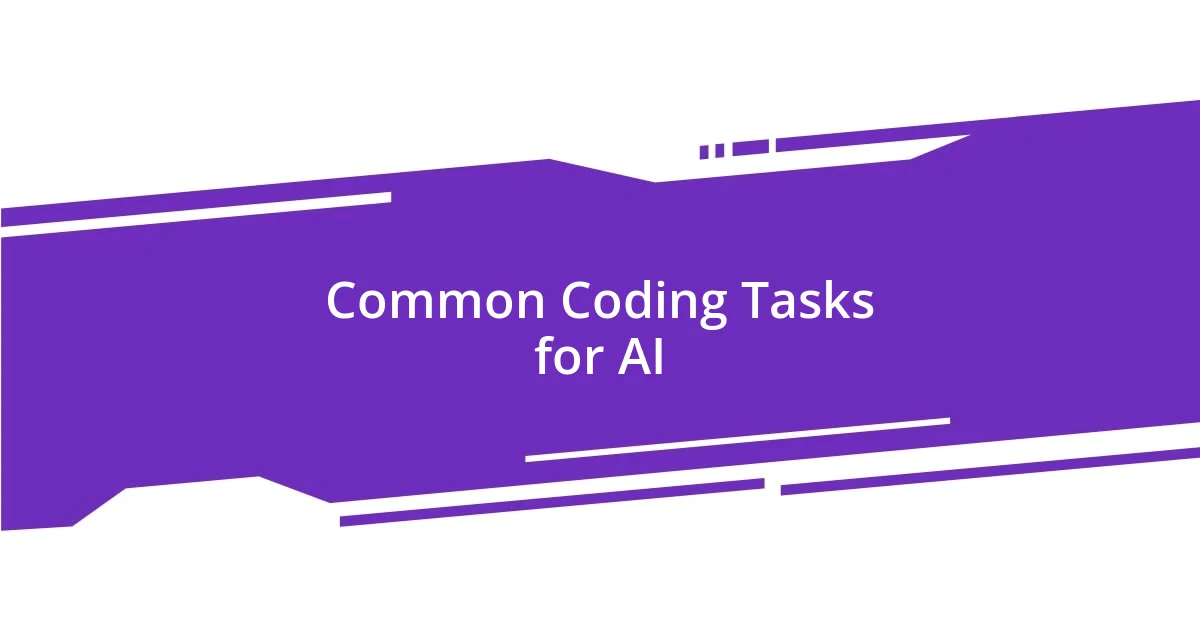
Common Coding Tasks for AI
One of the most common coding tasks for AI is code completion. I can’t tell you how many times I’ve stared blankly at my screen, pondering how to finish a function. However, with the aid of AI, it feels like a lightbulb goes off as it predicts the next steps I should take. This not only boosts my confidence but also allows me to keep my momentum going.
Error detection and debugging is another area where I find AI to be incredibly helpful. I recently had a project where I was stuck on a particularly persistent bug. After running the code through my AI assistant, I could almost feel the weight lift off my shoulders as it pinpointed the issue in seconds. This has taught me to trust that even the most experienced coders can miss small details — and that’s okay!
I’ve also discovered that AI can help with automated testing. Automating tests often seems tedious, but when AI assists in generating those tests, it turns a grueling task into an exciting challenge. I remember once seeing an AI-generated test case that identified issues I had never even considered before. It’s invigorating to think that with tools like these, I can elevate the quality of my projects while minimizing stress.
| Task | Description |
|---|---|
| Code Completion | AI assists by predicting how to finish coding functions. |
| Error Detection | AI identifies bugs and suggests corrections quickly. |
| Automated Testing | AI generates test cases that enhance code quality. |
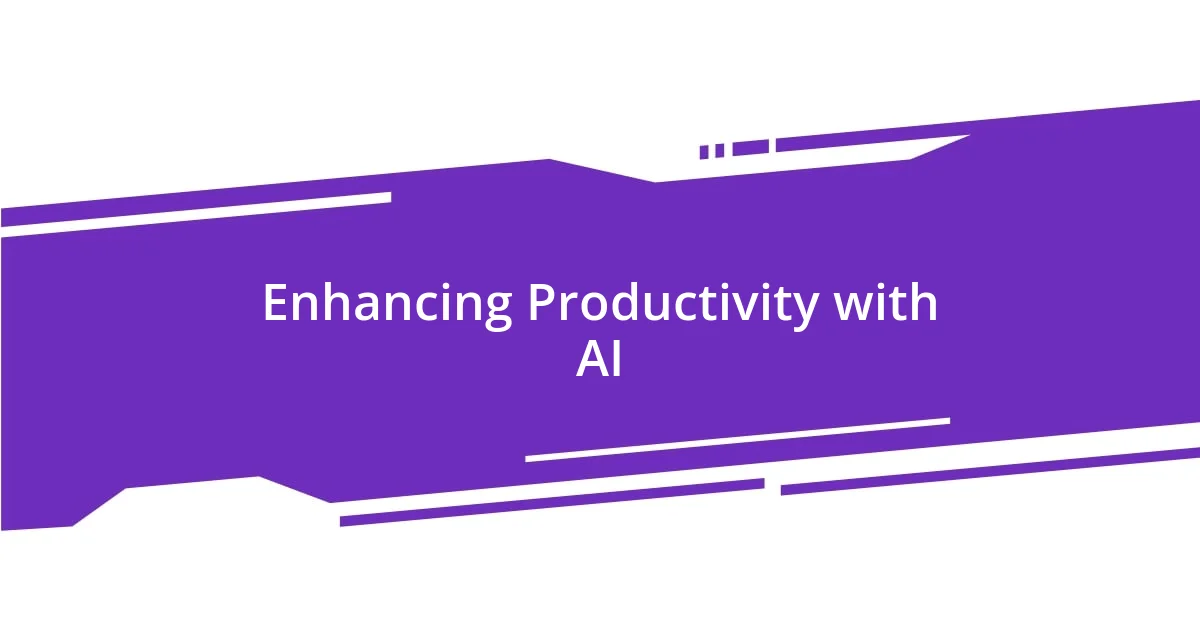
Enhancing Productivity with AI
Embracing AI in my coding process has truly transformed my day-to-day workflow. I remember a time when I felt overwhelmed by project demands, often wishing I had an extra pair of hands. With AI coding assistants, I’ve found that I can tackle several tasks simultaneously, almost as if I had my own personal coding army, resulting in remarkable reductions in project turnaround times.
It’s fascinating how AI can streamline my work. Just the other day, I was faced with a daunting amount of repetitive code to write. Instead of getting bogged down, the AI helped me generate templates based on previous work, turning a tedious task into a smooth and efficient experience. Have you ever felt the weight of monotony in coding? With AI, I felt a sense of renewed enthusiasm as I navigated through my projects, knowing I wasn’t alone in the process.
Moreover, the accessibility of AI tools has made a significant difference not only for me but also for many new developers I mentor. I recall guiding a beginner who struggled with a specific coding concept. With the help of AI, we broke it down together, and suddenly, the fog of confusion lifted. Seeing that sparkle of understanding in their eyes was rewarding. It’s clear to me that AI is not just a tool; it’s shaping a more inclusive environment for learning and collaboration in coding.
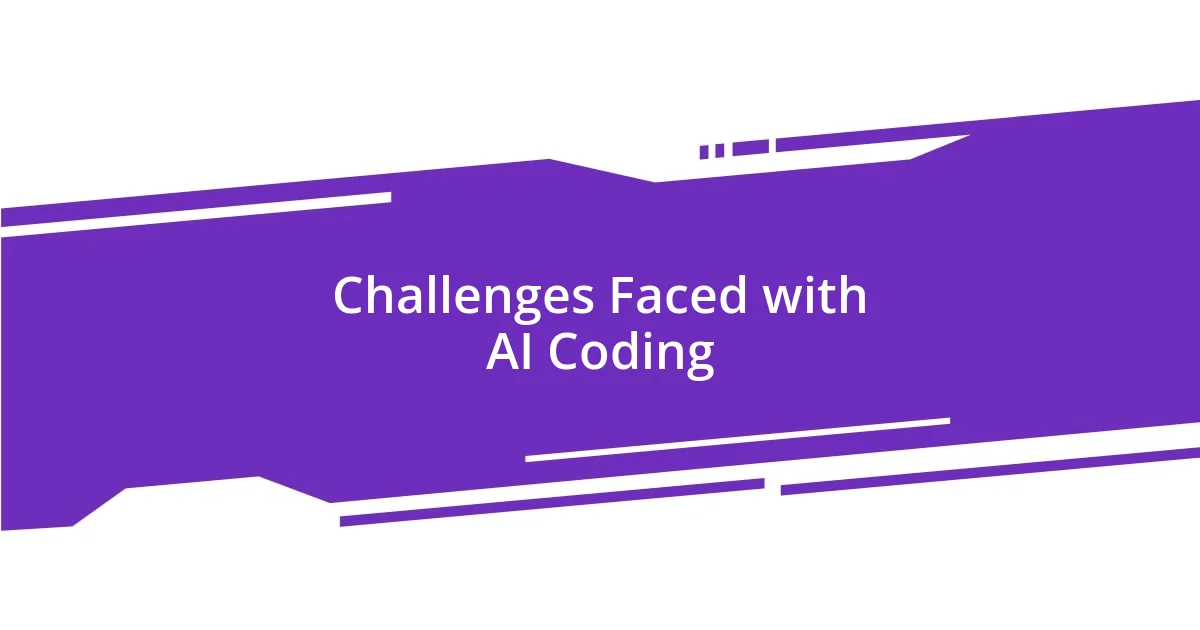
Challenges Faced with AI Coding
Navigating the world of AI coding assistants does come with its hurdles. For instance, I often find that the suggestions provided can sometimes be tangential to what I actually need. I remember a time when I asked for help with a specific function and the AI suggested a workaround that, while clever, didn’t quite fit my project’s requirements. This experience taught me to be judicious with AI’s recommendations and to double-check its outputs against my goals.
There’s also the matter of context. AI lacks the nuanced understanding of a project’s larger vision that human developers possess. Just recently, I had an AI tool assess my project and propose code that, while syntactically correct, didn’t align with the overall architecture I was aiming for. It made me realize how vital it is to maintain a human touch in coding, as AIs simply can’t grasp the full scope of creative intent behind the code.
And then there’s the challenge of dependency; I sometimes worry about becoming too reliant on AI tools. During one particularly intense coding session, I found myself procrastinating on critical thinking tasks because I had grown accustomed to short-cutting decisions with AI suggestions. The thrill of problem-solving, which I used to relish, started to fade away. Reflecting on this, I understand that while AI can enhance productivity, it’s imperative to balance its use with my own critical and creative thinking. Isn’t it fascinating how technology can both liberate and constrain our cognitive processes?
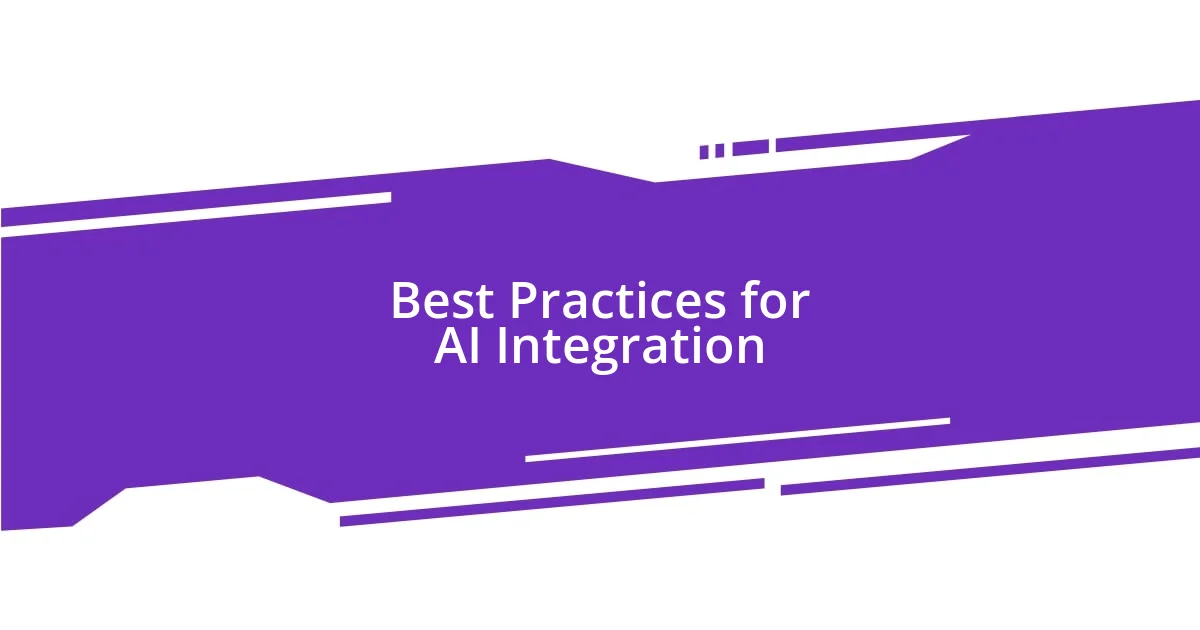
Best Practices for AI Integration
Incorporating AI effectively into my coding workflow has taught me various best practices that have greatly enhanced my efficiency. I’ve learned to set clear expectations when prompting AI; specificity is key. For instance, when I first started, I’d pose broad questions like “Can you write a function?” It wasn’t until I began asking for specific outcomes that I saw meaningful results. This transition really opened my eyes to how the clarity of my input directly impacts the quality of the AI’s output.
Another aspect I’ve found crucial is maintaining an iterative approach. Engaging with the AI in a back-and-forth manner allowed me to refine my code progressively. I recall an instance when I was building a complex algorithm. Initially, the AI’s suggestions were a bit off-mark. However, by continuously feeding it feedback and adjusting my queries, I was able to shape a solution that not only worked but also sparked some innovative ideas for future projects. Isn’t it amazing how collaboration with AI can feel similar to brainstorming with a colleague?
Lastly, I’ve realized the importance of integrating AI as a complementary tool rather than a crutch. During a recent project, I relied heavily on AI to generate components quickly, but I noticed that my own skills started to wane—I felt almost like an observer in my own coding journey. To counter this, I’ve made it a point to actively engage with the AI outputs, reworking and tweaking them manually. This practice not only keeps my skills sharp but also ensures that my personal coding style shines through. How do you maintain your coding individuality while working alongside AI?
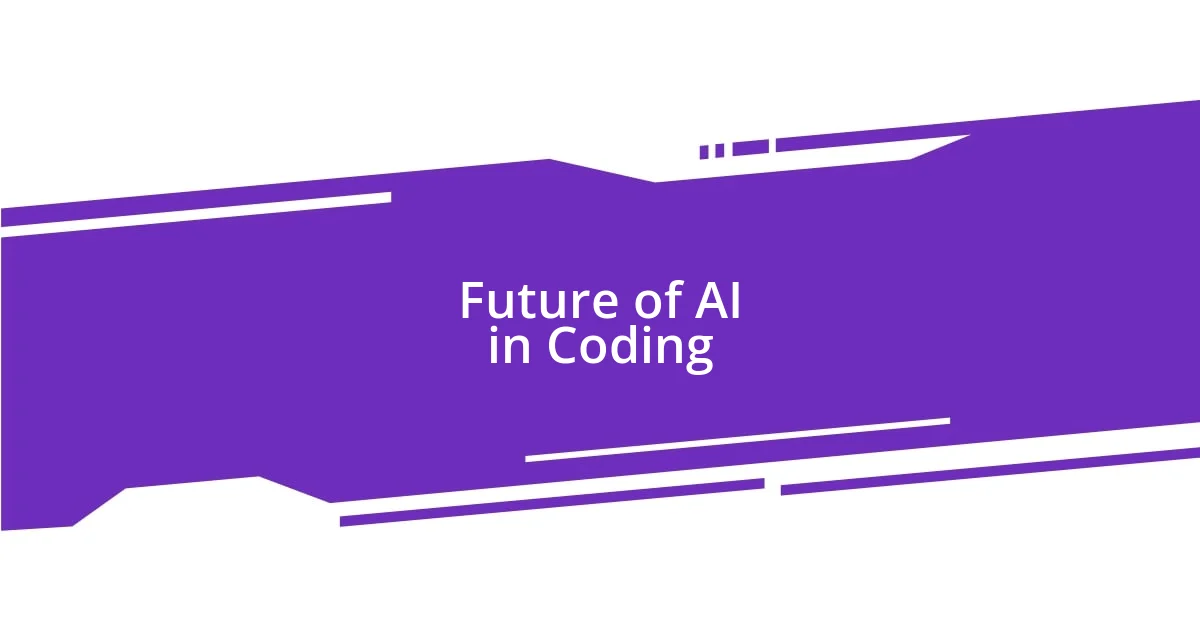
Future of AI in Coding
The future of AI in coding feels both exciting and daunting to me. I envision a landscape where AI doesn’t just assist but anticipates coding challenges before they even surface. Once, while tackling a project with tight deadlines, I wished for an assistant that could not only suggest code but also identify potential pitfalls early on. Imagine the relief of having AI provide insights on efficiency or code optimization before I even hit a snag—this isn’t just a dream; it could be our reality as AI continues to evolve.
I also think about the ethical implications that come with advanced AI in coding. There’s ongoing debate about the extent to which AI should influence decision-making in programming. During a project where accuracy was critical, I felt a shiver of uncertainty relying too much on an AI’s recommendations. As we look ahead, how do we ensure that our reliance on these tools doesn’t eclipse the ethical responsibilities we owe to ourselves and our users? Striking that balance will be crucial as AI becomes more pervasive in our workflows.
Moreover, collaboration with AI could redefine how we approach creativity in coding. I remember a phase when I felt stifled in my coding practice, simply following formulas instead of innovating. If we can steer AI toward enhancing our creative processes rather than stifling them, we might uncover new horizons. Picture this: A coding partner that not only challenges your logic but also sparks new ideas. This potential excites me, as it hints at a future where creativity coexists harmoniously with technology, driving us beyond the boundaries we once knew. Isn’t it thrilling to consider what we might create together?






